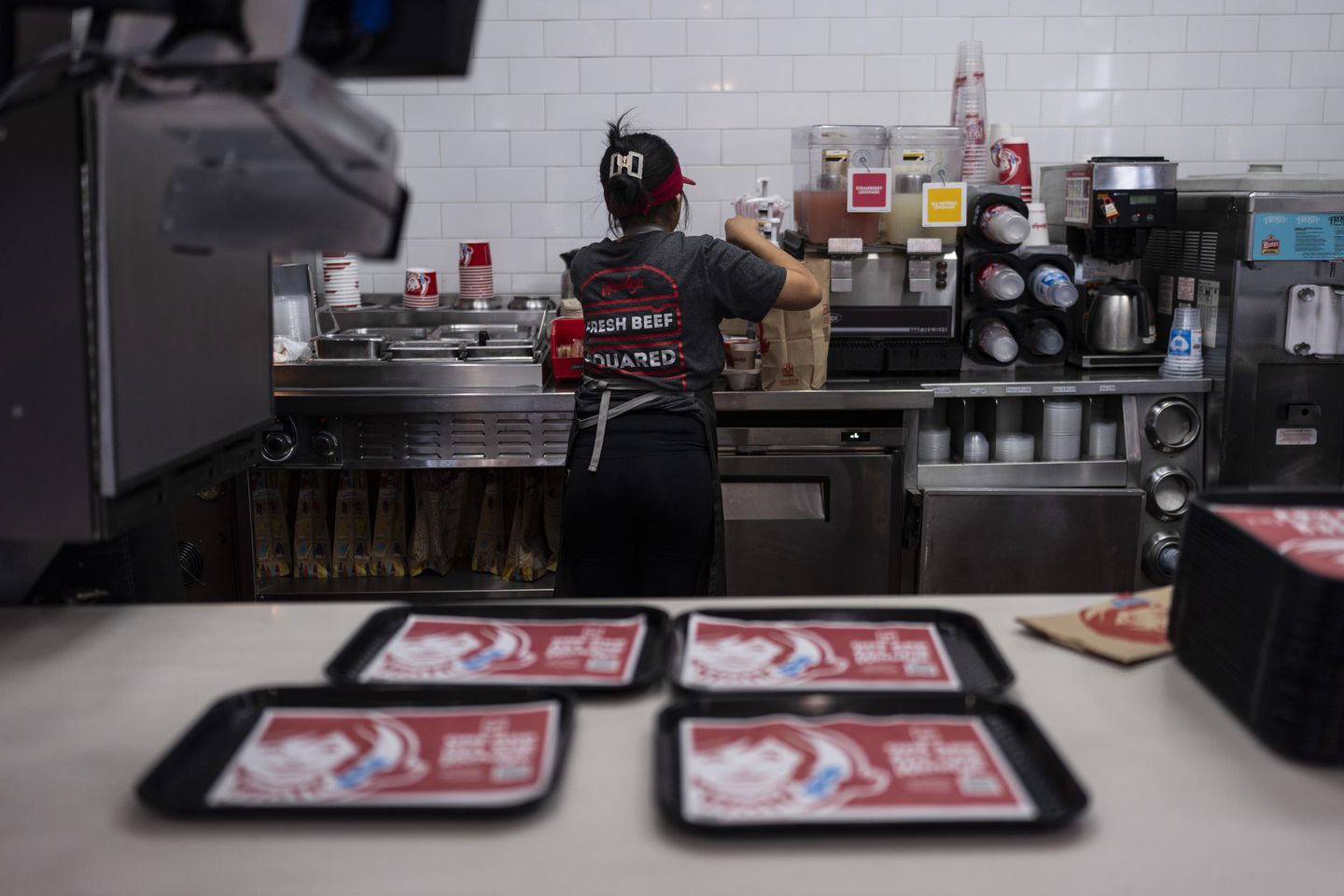
California’s $20 per hour minimum wage for fast food workers has cost the state a significant number of jobs since it took effect a year ago, according to separate reports.
The analyses from Pepperdine University and the Employment Policies Institute chalked up the workforce losses to fast food franchises cutting staff, raising prices and fleeing the state to offset increased payroll expenses after the wage increase became law in April 2024.
Examining revised data from the California Employment Development Department, Pepperdine and the independent think tank Beacon Economics tallied a decline of more than 23,100 jobs, or 3.2% of all positions in fast-casual eateries, over the past year — compared with 0.8% growth in the sector nationally.
The Christian university based in Malibu said the findings challenge earlier claims that raising the fast-casual wage floor by a few dollars above the minimum for other hourly workers had “minimal negative impact.”
“Like the sector they were researching, it’s obvious that the earliest studies, which painted a rosy picture regarding the impact of the Fast Act on fast food jobs, drew from too short a timeline to make their conclusions,” Pete Peterson, dean of the Pepperdine School of Public Policy, told The Washington Times.
Economist Christopher Thornberg, founding partner at Beacon Economics, said the numbers “should be a wake-up call” to state policymakers.
A supermajority of Democrats in the California State Legislature overrode Republican opposition to pass the minimum wage increase, and Democratic Gov. Gavin Newsom signed the legislation in September 2023.
“The employment losses in California’s fast-food industry are now evident, and they confirm what many had warned about: drastic wage hikes create real economic consequences, especially for entry-level workers,” said Mr. Thornberg, a former professor at the University of California, Riverside.
According to the Employment Policies Institute, which analyzed the latest data from the Bureau of Labor Statistics, California’s fast-food job losses comprised roughly two-thirds of eliminated positions in the sector nationwide from the law’s onset through September 2024
“California lawmakers including Gov. Newsom have failed to acknowledge the devastating consequences of this law, and now federal and state government databases show the losses are undeniable,” said Rebekah Paxton, research director at the conservative Washington, D.C., think tank.
Some leading minimum wage advocates pushed back on these conclusions. They pointed out that the reports provide no hard evidence that a $20 minimum wage caused the job losses.
Economist Michael Reich, chair of the University of California, Berkeley’s Center on Wage and Employment Dynamics, said the reports failed to control for seasonal dining habits, sluggish economic growth and stagnant population growth in California.
“My minimum wage studies have been published in leading refereed scholarly economics journals and have helped change the conventional wisdom in the economics profession,” Mr. Reich said. “Neither of these other studies would be accepted by such journals.”
In a February policy brief, he argued that accounting for these differences between states showed California’s minimum wage policies have not caused job losses.
The Times has reached out to California’s governor for comment.
In an October press release, Mr. Newsom’s office touted a study from Harvard University’s John F. Kennedy School of Government and the University of California, San Francisco that found fast food wages increased by at least $2.50 an hour immediately after the pay raise went into effect.
The study found “no evidence” that employers cut work hours or positions to compensate.
“In July, California set a record for the most fast food jobs ever before in state history,” the press release noted. “Since the law went into effect in April, the state has gained 7,400 fast food jobs, with consistent increases throughout the year.”
The two reports published this month cited other research suggesting that the $20 per hour minimum wage law has added to the high cost of operating fast-casual eateries in California, where inflation and taxes are among the highest in the country.
The Employment Policies Institute noted a study by the Israeli software firm Placer.ai that the trade publication Business Insider cited as evidence linking the $20 per hour fast-food wage floor to rising menu prices and declining foot traffic.
In-N-Out Burger, a popular California burger chain, announced last month that it will move its headquarters from Irvine in high-rent Orange County to Tennessee, where it plans to open nearly three dozen restaurants. The private company will maintain a California base in Baldwin Park, a Los Angeles County city where its first franchise opened in 1948.
Michael Warder, a California-based business consultant and former vice chancellor at Pepperdine who was not involved in this month’s research, said “common sense” suggests the minimum wage hike is not unrelated to fast-food chains decreasing their California footprint.
“If government orders a sizable increase in the minimum wage in a narrow segment of the restaurant sector, business owners have to make cuts in employment in order to compete and survive,” Mr. Warder said.





![Jasmine Crockett Justifies Mass Illegal Immigration With Bizarre Argument [WATCH]](https://www.right2024.com/wp-content/uploads/2025/03/1742007023_Jasmine-Crockett-Justifies-Mass-Illegal-Immigration-With-Bizarre-Argument-WATCH-350x250.jpg)

![NYC Tourist Helicopter Falls into Hudson River, Siemens Executive and Family Among Those Killed [WATCH]](https://www.right2024.com/wp-content/uploads/2025/04/NYC-Tourist-Helicopter-Falls-into-Hudson-River-Siemens-Executive-and-350x250.jpg)








